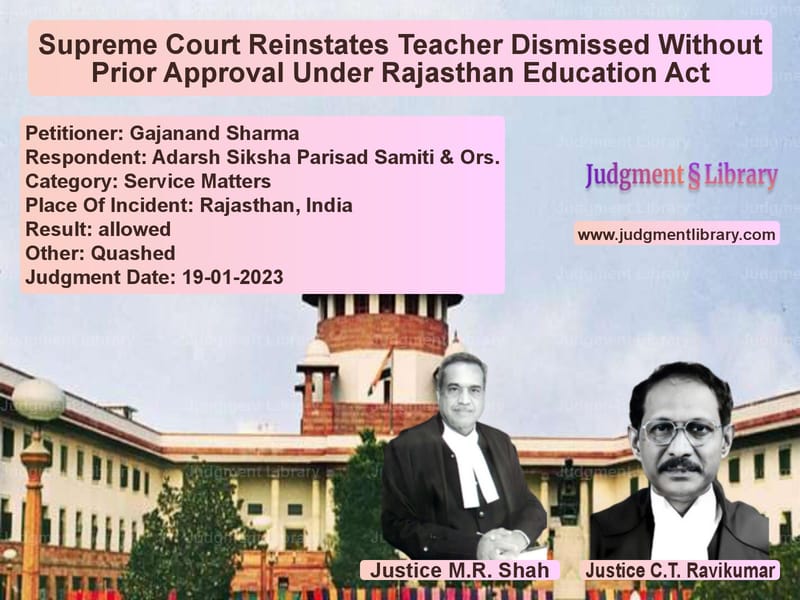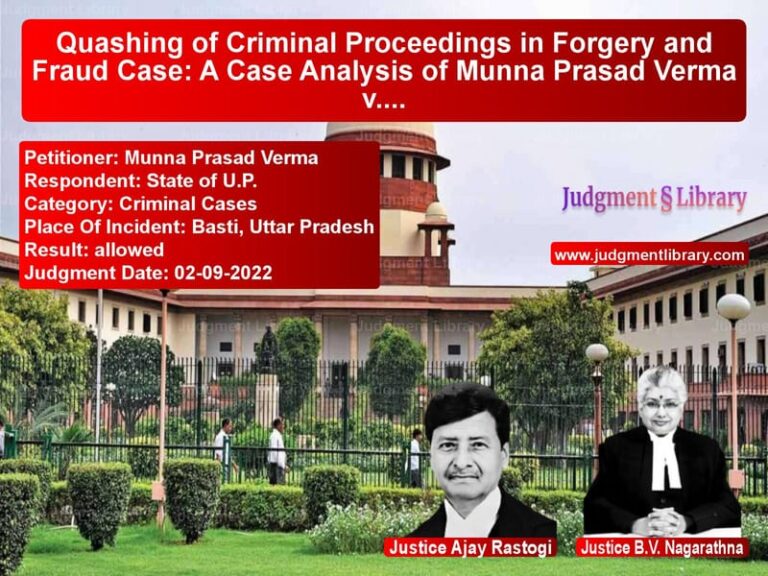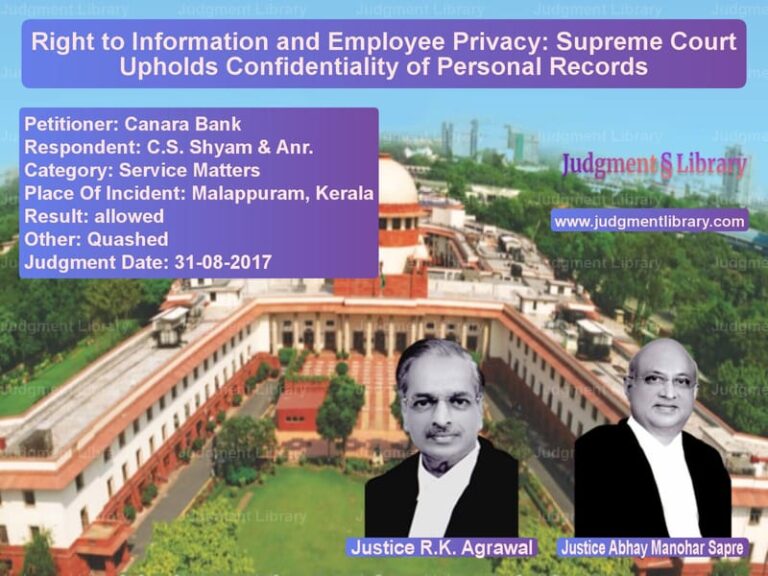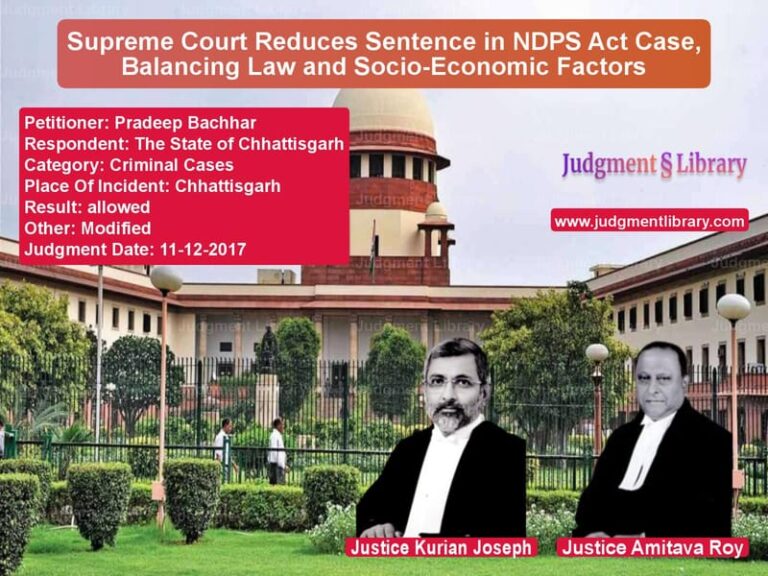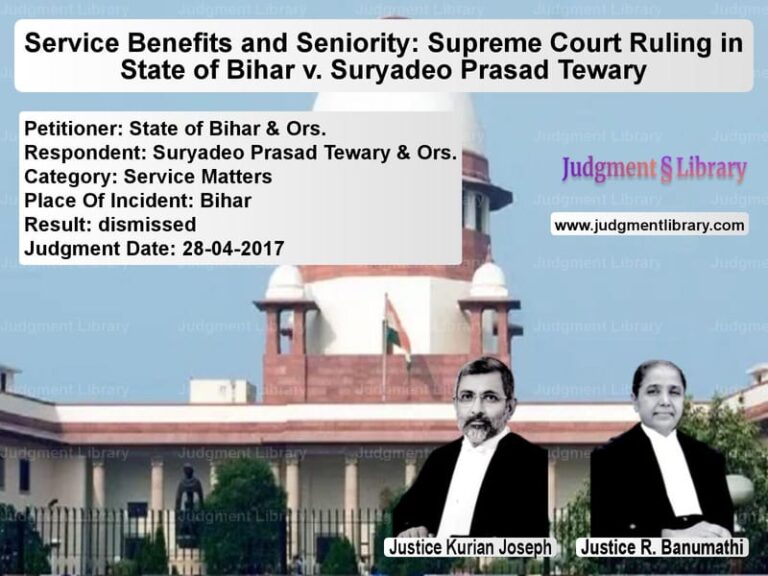Supreme Court Reinstates Teacher Dismissed Without Prior Approval Under Rajasthan Education Act
The case of Gajanand Sharma v. Adarsh Siksha Parisad Samiti & Ors. revolves around the wrongful termination of a teacher without obtaining prior approval from the Director of Education, as mandated by the Rajasthan Non-Governmental Educational Institutions Act, 1989. The Supreme Court overturned the Rajasthan High Court’s ruling, restoring the teacher’s employment and reinforcing the necessity of obtaining prior approval before terminating an employee in a recognized educational institution.
Background of the Case
The appellant, Gajanand Sharma, was employed as a teacher in a private, recognized educational institution governed by the Rajasthan Non-Governmental Educational Institutions Act, 1989. In 1998, he was dismissed from service following a disciplinary inquiry. However, his termination was challenged on the grounds that the school management had failed to secure prior approval from the Director of Education, as required under Section 18 of the Act.
The matter was initially heard by the Educational Tribunal, which ruled in favor of the appellant, setting aside the termination order due to non-compliance with statutory requirements. The decision was later upheld by the Single Judge of the Rajasthan High Court. However, upon appeal by the management, the Division Bench of the High Court overturned the previous rulings, stating that prior approval was not required for terminations following disciplinary proceedings.
Aggrieved by this decision, the appellant approached the Supreme Court, challenging the High Court’s interpretation of Section 18 of the Rajasthan Non-Governmental Educational Institutions Act, 1989.
Key Legal Issues
1. Is Prior Approval of the Director of Education Required for Termination After a Disciplinary Inquiry?
The appellant argued that the provisions of Section 18 of the Act explicitly state that no employee of a recognized institution can be dismissed, removed, or reduced in rank without obtaining prior approval from the Director of Education.
The respondent (school management) countered that prior approval is necessary only in cases where no departmental inquiry has been conducted. Since a disciplinary inquiry was conducted in this case, they argued that approval from the Director of Education was not required.
2. Interpretation of Section 18 of the Rajasthan Non-Governmental Educational Institutions Act, 1989
The Supreme Court examined the wording of Section 18, which states:
“Subject to any rules that may be made in this behalf, no employee of a recognized institution shall be removed, dismissed, or reduced in rank unless he has been given by the management a reasonable opportunity of being heard against the action proposed to be taken; provided that no final order in this regard shall be passed unless prior approval of the Director of Education or an officer authorized by him in this behalf has been obtained.”
The appellant contended that this provision applies uniformly to all terminations, including those following disciplinary inquiries. The respondent management, however, argued that this requirement does not apply when the termination follows a formal disciplinary proceeding.
3. Relevance of the Supreme Court’s Decision in Raj Kumar v. Director of Education
The appellant relied on the Supreme Court’s previous ruling in Raj Kumar v. Director of Education (2016) 6 SCC 541, which held that similar provisions in the Delhi School Education Act required prior approval from the Director of Education before terminating an employee.
The Division Bench of the Rajasthan High Court had refused to apply this precedent, arguing that the Raj Kumar case did not consider the impact of T.M.A. Pai Foundation v. State of Karnataka (2002) 8 SCC 481, which dealt with the autonomy of private educational institutions.
Supreme Court’s Judgment
The Supreme Court ruled in favor of the appellant, holding that:
“The Rajasthan High Court erred in ignoring the binding precedent in Raj Kumar v. Director of Education. Section 18 of the Rajasthan Non-Governmental Educational Institutions Act, 1989, clearly mandates prior approval from the Director of Education before terminating an employee of a recognized institution.”
The Court further emphasized:
“The legislative intent behind requiring prior approval is to prevent arbitrary and unfair dismissals. The provision applies uniformly, regardless of whether the termination follows a disciplinary inquiry.”
The Supreme Court set aside the High Court’s judgment, restored the Tribunal’s ruling, and directed the reinstatement of the appellant with 50% back wages and full seniority benefits.
Implications of the Judgment
This ruling has far-reaching implications for employment in private educational institutions:
- Strengthening Employee Protections: The judgment ensures that teachers and other employees of recognized educational institutions cannot be arbitrarily dismissed.
- Affirming Judicial Discipline: The ruling reinforces that High Courts must follow binding precedents set by the Supreme Court.
- Clarifying the Scope of Section 18: The decision establishes that prior approval from the Director of Education is mandatory for all dismissals, including those following disciplinary inquiries.
- Limiting the Autonomy of Private Schools: The ruling restricts the ability of private educational institutions to unilaterally terminate employees without following due process.
Conclusion
The Supreme Court’s ruling in Gajanand Sharma v. Adarsh Siksha Parisad Samiti & Ors. reinforces the importance of procedural fairness in employment terminations within private educational institutions. The decision clarifies the application of Section 18 of the Rajasthan Non-Governmental Educational Institutions Act, 1989, ensuring that no employee is dismissed without prior approval from the Director of Education. This judgment sets a strong precedent for protecting the rights of employees in the education sector.
Petitioner Name: Gajanand Sharma.Respondent Name: Adarsh Siksha Parisad Samiti & Ors..Judgment By: Justice M.R. Shah, Justice C.T. Ravikumar.Place Of Incident: Rajasthan, India.Judgment Date: 19-01-2023.
Don’t miss out on the full details! Download the complete judgment in PDF format below and gain valuable insights instantly!
Download Judgment: gajanand-sharma-vs-adarsh-siksha-parisa-supreme-court-of-india-judgment-dated-19-01-2023.pdf
Directly Download Judgment: Directly download this Judgment
See all petitions in Employment Disputes
See all petitions in Public Sector Employees
See all petitions in Disciplinary Proceedings
See all petitions in Termination Cases
See all petitions in Judgment by Mukeshkumar Rasikbhai Shah
See all petitions in Judgment by C.T. Ravikumar
See all petitions in allowed
See all petitions in Quashed
See all petitions in supreme court of India judgments January 2023
See all petitions in 2023 judgments
See all posts in Service Matters Category
See all allowed petitions in Service Matters Category
See all Dismissed petitions in Service Matters Category
See all partially allowed petitions in Service Matters Category

